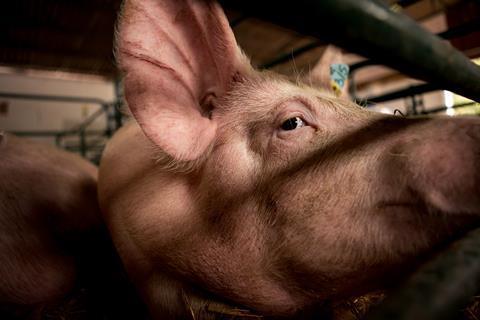
Campaigners have urged the UK government to uphold its high animal welfare standards as fears around chlorinated chicken and hormone beef imports increase, amid potential trade deals with the US and India.
As the Labour government prepares to unveil its new trade strategy and potential US and Indian trade deals loom, a new report released this week by Animal Policy International, Compassion in World Farming and the RSPCA warns that the UK should enforce strict animal welfare requirements in any trade agreements to avoid becoming a dumping ground of animal products produced to lower standards than the UK’s.
The report has found that of the UK’s “88 trading partners that can currently, or may soon, export animal products to the UK without tariffs”, the vast majority (95%) “have lower farmed animal welfare standards than the UK”.
The research also claimed over 50% of UK pork is imported from countries that still allow sow stalls, which has been banned in the UK since the 1990s.
It warned that “the risk of compromising animal welfare gains has intensified” as the UK forges ahead with its independent trade policy in the post-Brexit era.
The government is currently pursuing a trade deal with the US, which is rumoured to include animal products such as chicken, pork and beef. This has brought renewed fears that the UK may allow controversial US-made products like hormone-treated beef and chlorinated chicken to hit British supermarket shelves as part of the deal.
Meanwhile, ministers are also reportedly on the cusp of landing a highly anticipated free trade deal with India that could boost agrifood trade between the two nations.
Campaigners have warned that, without strict enforcement, these new deals could open the borders to products made using methods that have been illegal in the UK for years – noting that countries like India and Mexico still allow the use of barren battery cages for egg-laying hens.
The ‘Closing the Welfare Gap: Why the UK Must Apply Its Animal Protection Standards to Imports’ claims that a “significant portion of animal products sold in the UK are imported from countries with less stringent animal welfare regulations”, which “undermines the effectiveness of UK laws”.
The authors have warned that “recent free trade agreements have set concerning precedents by allowing imports from systems that are illegal in the UK”, such as the trans-pacific trade coalition the UK joined at the end of last year – which includes countries such as Canada, Chile, Mexico and Japan – and that negotiations with nations like India and the US threaten to further flood the UK market with lower-welfare products, “potentially erasing decades of progress in animal protection”.
Experts urged the government to ensure the UK’s commitment to animal welfare extends to products sold in the UK regardless of origin, and for government to devise robust and comprehensive legislation on imports.
David Bowles, head of public affairs at the RSPCA, said: “As discussions on any possible future trade deal between the UK and US to avoid tariffs come under the public spotlight, we remain steadfast that the striking of any deal with the US must not make concessions that allow imported animal products produced to very low welfare standards on to our supermarket shelves.
“As well as introducing low-welfare products into the UK, it would prevent a better trade deal with the EU and would undermine our own higher domestic standards – hitting the livelihoods of UK farmers hard, all while flying in the face of what many consumers want.”
Read more: Can a UK-US trade deal avoid ‘dreaded’ chlorinated chicken?
Mandy Carter, co-executive director at Animal Policy International, said “allowing imports with lower welfare standards creates a race to the bottom that sells out British values and farmers”.
James West, chief public affairs manager at Compassion in World Farming, added: “An overwhelming 84% of British people support restricting or banning low-welfare imports that do not meet UK standards.
“Despite this strong public sentiment, current regulations, except for slaughter, do not require UK farm animal welfare standards to be met for a product to be imported or sold in the UK.
“It is imperative that the government ensures all animal products sold in the UK, whether produced domestically or imported, meet British animal welfare standards.”
A government spokesperson responded: “We will only ever sign trade agreements which aligns with the UK’s national interests, and we will not lower our high food standards.”







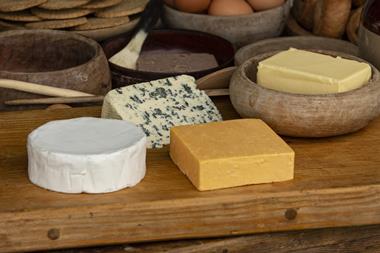
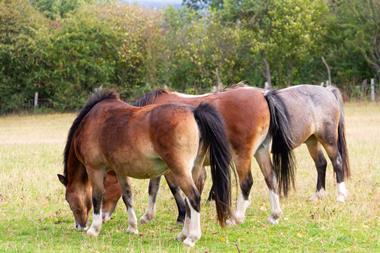
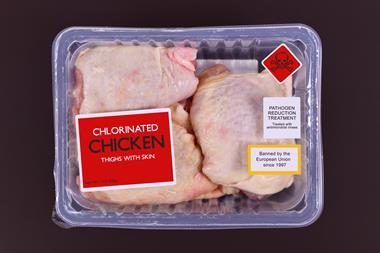
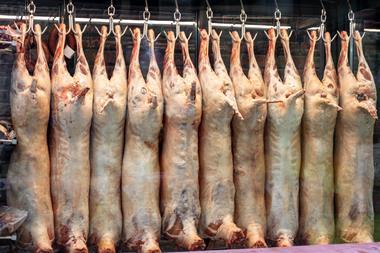
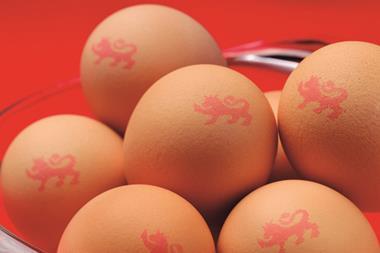
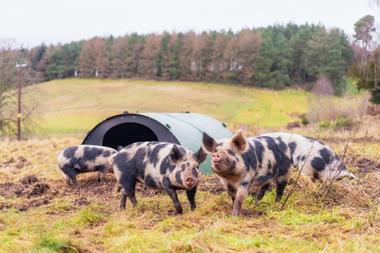






No comments yet